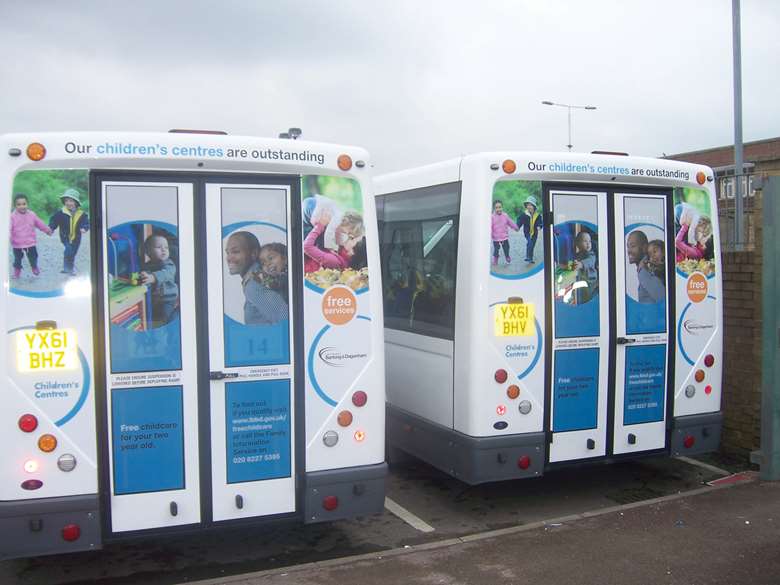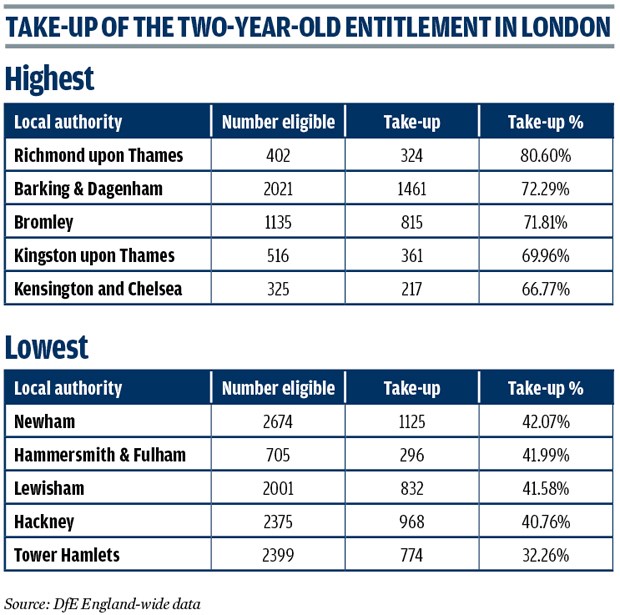London struggles to deliver free childcare
Derren Hayes
Tuesday, March 17, 2015
Economic and workforce factors are making it harder for councils to deliver sufficient childcare places for all eligible two-year-olds.

After months of being on the back foot over the free childcare for two-year-olds policy, the Department for Education went on the offensive last month with the publication of figures showing London councils were largely to blame for the shortage of places being created under the scheme.
Despite the government pumping more than £1bn into funding the free entitlement for 570 hours of free childcare a year for the most disadvantaged two-year-olds since its introduction in September 2013, a CYP Now investigation in August 2014 found the scheme was 40,000 places short of the 260,000 target.
The government has maintained the fault lies with local authorities, and recent data released by the DfE suggests the area with the biggest shortfall is London.
The figures show that of the 44,762 eligible two-year-olds in the capital, only half are taking up the offer of a free childcare place. In addition, nine of the 10 English councils with the lowest uptake of free places are in London, Dudley being the exception (see table).
Poor return on investment
The department claims £175m was given to the 32 London boroughs in 2014/15 to provide places through the scheme, and that the current return on the investment is not good enough.
"We are expecting more from local authorities," childcare minister Sam Gyimah says. "We will not shy away from naming those that are underperforming."
But London Councils claim the issue is more complicated than portrayed by ministers.
A London Councils spokesperson said: "The biggest challenges facing the London childcare market are capacity, demand and quality.
"The government provides London boroughs with funding between £5.28 and £7.08 per hour to deliver the two-year-old entitlement.
"This funding has not kept pace with the rising costs of childcare in London, which is 28 per cent higher than some regions. Without sufficient funding, providers cannot cover the cost of delivering the entitlement.
"Our analysis shows more than four in 10 early years settings are already full and many providers with capacity are not located in the areas of greatest need."
June O'Sullivan, chief executive of charity and social enterprise the London Early Years Foundation, has sympathy with councils' plight. "I don't think you can blame local authorities entirely," she says. "There is no government money or will to pay the full rate and invest in some capital start-up costs."
However, she says there are practical problems with how local authorities engage with childcare providers that act as barriers to creating places. For example, she says mothballed community buildings could be converted into childcare facilities, but all too often the high rents that council property management departments expect to achieve make it unaffordable.
Higher staff costs also make it harder for the finances to stack up. O'Sullivan says: "Councils expect potential providers to offer the London Living Wage to staff of £9.16 an hour while delivering the funded offer at £5.09 an hour. It's just not possible."
Lack of social housing and the high cost of renting in the centre of London make the staffing issue even more acute, factors that O'Sullivan says councils will need to think creatively to overcome.
"There should be a discount for key workers travelling into zones one and two, and an increase in key worker housing. We need to increase low rent and social housing for those people to be able to rent."
Despite the DfE data, James Hempsall, the national support director for Achieving Two Year Olds, remains upbeat about the reach of the free entitlement and points to the fact that the numbers of children taking it up are constantly increasing.
He says: "All local authorities have done really well to start to embed this programme to become one that parents know about, claim funding for and ultimately take up their place.
"We are seeing more provision open up in childminding, schools and children's centres to complement existing and expanding providers."
Sophisticated systems
Hempsall adds that those councils that have more sophisticated and integrated systems and comprehensive promotion are the ones that are funding more places.
He says: "What's key is each authority should have its own wider communications available to all parents and professionals complemented by clear outreach strategies that...
take the message direct to eligible families that need a more personal touch."
O'Sullivan praises the London Borough of Barking & Dagenham for its work to promote the scheme. The east London council, which has the second highest percentage take-up of places in the capital, advertised the scheme on municipal vehicles, lampposts and pull-up banners in shops. In addition, postcards and text messages were sent to eligible families, as well as door knocking carried out.
Rikki Damsgaard, strategic childcare development manager for Barking & Dagenham, says: "The main reasons for our take-up is perseverance and chasing. We will not just give parents a letter or let them know that they are eligible for a place.
"We will find a childcare place for each two-year-old and ensure that they take it up by both contacting parents and the childcare provider to ensure the child has accessed the programme."
Whether the shortfall is down to lack of funding from local or national government, early years experts say it will continue until there is a fundamental review of the scheme, and the 20 per cent gap between the cost to providers of delivering a place and fee paid for doing so is addressed.





